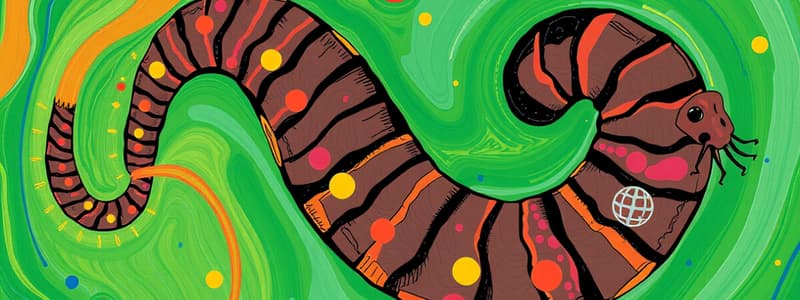Podcast
Questions and Answers
What phylum do roundworms belong to?
What phylum do roundworms belong to?
Nematoda
Explain what it means for roundworms to be pseudocoelomates.
Explain what it means for roundworms to be pseudocoelomates.
Pseudocoelomate animals have a pseudocoelom, which is a fully functional body cavity partially lined by mesoderm.
Where are roundworms typically found?
Where are roundworms typically found?
In the human gut, soil, marine and freshwater habitats, and on land.
Describe some physical features of roundworms.
Describe some physical features of roundworms.
Roundworms are exclusively parasitic.
Roundworms are exclusively parasitic.
What digestive feature did roundworms develop first?
What digestive feature did roundworms develop first?
How do most roundworms move nutrients and gases throughout their bodies?
How do most roundworms move nutrients and gases throughout their bodies?
Describe roundworm movement.
Describe roundworm movement.
What type of skeleton do roundworms have?
What type of skeleton do roundworms have?
Roundworms reproduce ________.
Roundworms reproduce ________.
List three factors attributing to human diseases related to parasitic roundworms.
List three factors attributing to human diseases related to parasitic roundworms.
How would you get hookworms?
How would you get hookworms?
Describe the disease trichinosis.
Describe the disease trichinosis.
Describe how hookworms would infect a human.
Describe how hookworms would infect a human.
What is the most common roundworm that causes human infection?
What is the most common roundworm that causes human infection?
Flashcards are hidden until you start studying
Study Notes
Roundworms Overview
- Roundworms belong to the phylum Nematoda.
- They can be found in diverse environments, including soil, marine, and freshwater habitats.
Body Structure and Features
- Roundworms are pseudocoelomates with a "false cavity" partially lined with mesoderm-derived tissue.
- They range in size from microscopic to about 3.3 feet (1 meter).
- Their bodies have three tissue layers and a protective, flexible, grooved outer covering.
Lifestyle and Habitat
- Approximately 60 types of roundworm inhabit humans, primarily in the gut, but some can migrate to other body parts.
- Transmission to humans typically occurs through contaminated hands or skin contact with eggs or larvae in soil.
Movement and Nutrition
- Roundworms lack circulatory and respiratory organs, relying on diffusion for gas exchange and nutrient movement.
- They possess muscles along their length that enable thrashing movements, utilizing a hydrostatic skeleton formed by their pseudocoelom.
Reproduction
- Roundworms have separate sexes and reproduce sexually; females produce eggs while smaller males produce sperm.
- Fertilization occurs internally, with a complex lifecycle in parasitic species involving multiple hosts.
Diseases and Infection
- Common diseases from parasitic roundworms are linked to lack of education, hygiene, and poor sanitation.
- Key species causing human diseases include hookworms, pinworms, and Ascaris worms.
- Hookworms infect humans primarily through skin penetration, often via the feet.
Specific Conditions
- Trichinosis results from consuming raw or undercooked pork infected with the larvae of Trichinella spiralis, leading to symptoms like abdominal pain and fatigue.
- Infection from hookworms involves larvae that mature in soil and penetrate human skin, with potential transmission through feces or contaminated areas.
Key Terms
- Pseudocoelomate: An organism with a false body cavity partially lined by mesoderm.
- Hydrostatic skeleton: A structure providing support through fluid pressure in a closed cavity.
- Trichinosis: A disease caused by eating infected meat, leading to gastrointestinal and systemic symptoms.
Studying That Suits You
Use AI to generate personalized quizzes and flashcards to suit your learning preferences.




